
Past News
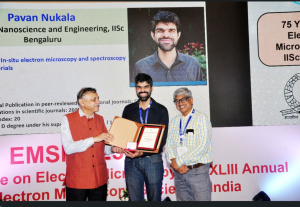 |
Dr. Pavan Nukala wins the Excellence in Microscopy Award 2025 |
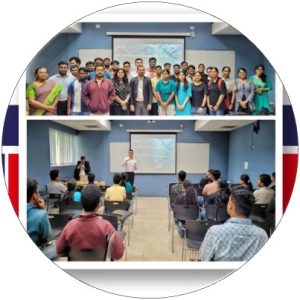 |
Guest lecture on next-gen CMP technologies by KC Loh |
CeNSE hosted Mr. Kok Chian Loh, SC KA Leader at 3m Electronics, for an engaging session on innovations in Chemical Mechanical Planarization (CMP), fostering academic–industry synergy in semiconductor manufacturing.
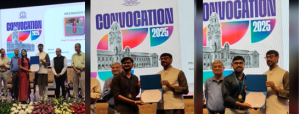 |
CeNSE students shine with national research awards |
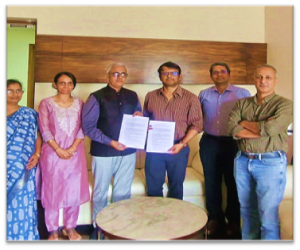 |
CeNSE–RVCE sign MoU to advance aerospace and nanotech collaboration |
CeNSE, IISc, and RV College Of Engineering (RVCE).
have partnered to drive innovation in advanced materials, sensors, and nanotechnology for next-generation aerospace systems.
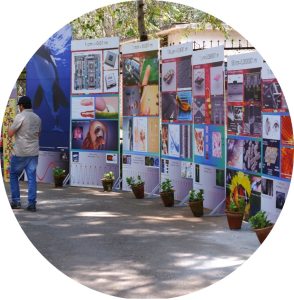 |
Your CeNSE Journey Begins Here – Welcome August 2025 Batch! |
We are delighted to welcome you to the Centre for Nano Science and Engineering at IISc. As you begin this exciting new chapter, know that you are now part of a vibrant, interdisciplinary community driven by curiosity, innovation, and collaboration. At CeNSE, you’ll have the opportunity to learn from leading researchers, explore cutting-edge technologies, and contribute to impactful science. We look forward to seeing the ideas you bring, the questions you ask, and the discoveries you make. Here’s to a fulfilling and inspiring journey ahead!
 |
CeNSE, IISc and BITS Pilani join hands to advance research and academic excellence |
We’re excited to announce a landmark MoU between two of India’s premier institutions—BITS Pilani and IISc, Bengaluru. This strategic partnership will foster collaborative research, academic exchanges, and innovation across disciplines.
The MoU outlines joint research projects, symposia, student and faculty exchanges, and access to world-class facilities like Centre for Nano Science and Engineering (CeNSE) at IISc, aimed at addressing critical scientific and technological challenges.
With a shared vision of nurturing future innovators, this partnership sets a strong precedent for institutional collaboration in India’s higher education and research landscape.
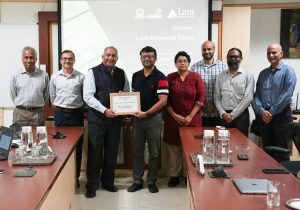 |
CeNSE, IISc partners with Lam Research to Lam Research to launch a foundational course in semiconductor equipment design |
Lam Research, in partnership with the Centre for Nano Science and Engineering (CeNSE) at the Indian Institute of Science (IISc), launched a foundational course in semiconductor equipment design and engineering to help students grasp the fundamentals of our rapidly evolving industry. Through this academic partnership, Lam Research is proud to bring its proven internal workforce training materials to academic classrooms.
This initiative is supplementary to Lam’s ongoing partnership with IISc, with a goal of training up to 60,000 Indian engineers in semiconductor manufacturing technologies via a nationwide rollout of Lam’s Semiverse® Solutions, a set of industry leading virtualised computational platforms for semiconductor manufacturing.
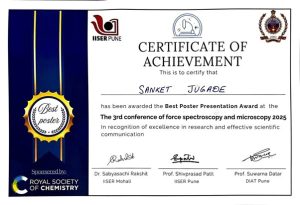 |
Sanket Jugade wins the Best Poster Award |
Congratulations to Sanket Jugade, PhD, CeNSE, IISc on winning the Best Poster Presentation Award at the 3rd Conference on Force Spectroscopy and Microscopy (ConForce-2025), held from 15th-18th June at Casuarina Resort, Kurunji!
Poster Title: Dynamic Scanning Force Microscopy for Nanoscale Imaging of Ultrathin Graphene on Liquid Interface
The conference brought together a vibrant community of researchers, including pioneers in Atomic Force Microscopy, nanomechanical measurements, single-molecule force spectroscopy, and optical/magnetic tweezers applied to polymers, membranes, nanomaterials, biomolecules, and soft matter.
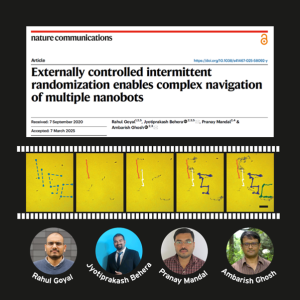 |
Externally controlled intermittent randomization enables complex navigation of multiple nanobots |
This paper introduces a novel method for independently controlling multiple identical nanobots using global magnetic fields. By combining intermittent orientation randomization and real-time feedback, the authors enable precise navigation of nanobots along distinct paths without requiring physical differences between them. The technique, demonstrated with up to four nanobots, offers scalability and speed, paving the way for advanced applications in targeted drug delivery, nanoscale manufacturing, and biomedical engineering.
Read further: Nature Communications 16, Article 2700 (2025).
https://doi.org/10.1038/s41467-025-58092-y
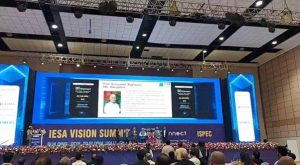 |
Congratulations to Prof. Srinivasan Raghavan on receiving the Techno Visionary |
Congratulations to be Prof. Srinivasan Raghavan on receiving the Techno Visionary Award 2025 at the Indian Electronics and Semiconductor Association (IESA) Vision summit 2025, March 4-7, 2025.
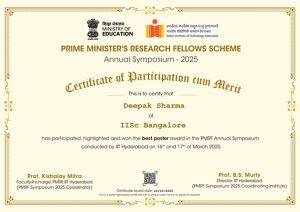 |
Deepak Sharma wins the Best Poster Award |
Congratulations to Deepak Sharma for winning the Best Poster Award in the Interdisciplinary category at the PMRF Symposium 2025, held at Indian Institute of Technology Hyderabad on March 16th and 17th.
Presentation Title: “Mixed Signal Front End for the Olfactory Systems”
Check out the research activities of Prof. Navakanta Bhat’s group at: https://www.cense.iisc.ac.in/navakanta-bhat/
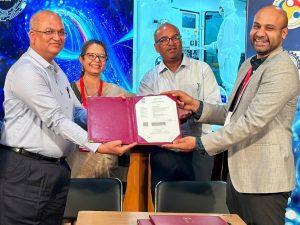 |
CeNSE, IISc technology transfer to Antigone Solutions |
Researchers from the Heterojunction Lab have developed an indigenous Pyroelectric IR Photodetector for advanced fire sensing applications!
Optimized for the 4.2 μm “fire-band,” this sensor powers automated fire detection and suppression systems. Now transferred to Antigone Solutions, this Made-in-India tech targets a defense application that currently imports 40,000 units worth ₹40 Cr—tapping into a global market projected at $220M in 2025.
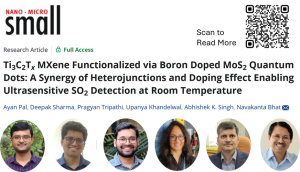 |
Ultrasensitive Detection of sulphur dioxide to monitor air pollution |
Quantum Dots Assembled on MXene Nanosheets for Ultrasensitive SO2 Detection
Sulfur dioxide (SO₂) pollution remains a significant environmental and public health concern, particularly in areas with high levels of industrial activity. As a result, accurate monitoring of SO₂ levels is essential for assessing air quality, regulating emissions, and preventing environmental degradation.
To address this challenge, Prof. Navakanta Bhat and his team have developed a chemiresistive sensor that uses the assembly of boron-doped molybdenum sulfide (B-MoS2) quantum dots on Ti3C2Tx MXene nanosheets. An enhancement mechanism, induced by the synergistic effect of heterostructures and doped boron heteroatoms is proposed for highly responsive detection of SO2 gas at room temperature. The scientific findings of this work may pave the way for future exploration of next-generation field-deployable sensors.
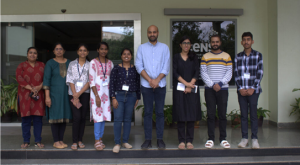 |
Advanced Training Program on Semiconductor Fabrication and Characterization |
The Ministry of Tribal Affairs, in association with CeNSE at IISc, has launched a unique program to upskill students from the tribal community in semiconductor technology. https://cense.iisc.ac.in/mota_training/
The training program was conducted at CeNSE, IISc from 4th to 13th November 2024. During this “Advanced Training Program”, candidates had an opportunity to be in the clean room fabrication facility and work with various equipment and processes to make basic micro / nano scale devices.
Training Modules included: 1. MEMS Cantilever Fabrication 2. MOS Capacitor Fabrication 3. Solar Cell (Photovoltaics) Fabrication 4. Gas Sensors Fabrication
This training is a perfect hands-on experience opportunity for prospective students to IISc.
The advanced training program is a 90-hour course that is NSQF-certified, at level 6.5 (https://nqr.gov.in/qualifications/3808). Candidates will also be awarded 3 credits upon completion of this training program.
They can now seamlessly transfer the 3-credits that they get after attending the training. As per the Academic Bank of Credits (ABC), there is now a seamless integration of skills and experiences which can be converted into a Credit-based system.
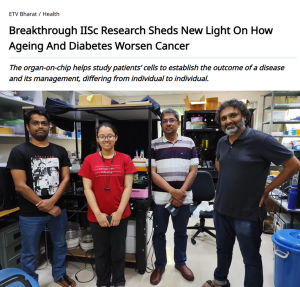 |
Microfluidic devices to understand how aging and diabetes hasten the spread of cancerRead this research article published in Wiley Small, 2025, 2405998 at https://doi.org/10.1002/smll.202405998 |
It is well known that disorders in our metabolism as is seen in conditions like diabetes and aging hasten the spread of cancer but which steps of the spread are specifically accelerated remain ill-understood. In this study, the groups of Prof Ramray Bhat and Prof Prosenjit Sen, with expertise in cancer cell biology and microfluidics respectively, asked whether chemical metabolites that accumulate in diabetes or aging, specifically one called methyglyoxal accelerate the process of intravasation, the entry of breast cancer cells from their site of origin to the blood vessel. To do so, they designed a novel dual organ-on-chip, a microfluidic culture platform that reconstructs the anatomy of a tumor sitting near a blood vessel, that is amenable to microscopic observation. Using the chip, they revealed that exposure to methyglyoxal accelerates cancer cell entry into the blood vessel environment by altering, through interesting and diverse ways, the extracellular matrix: the glue that holds together tissues and organs. The innovation of such a chip opens the door to exciting therapeutic and other translational endeavours in cancer research.
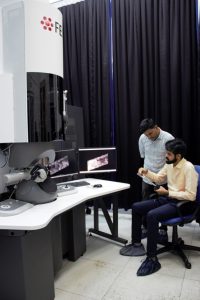 |
Study reveals that Self shocks turn crystal to glass at ultralow power densityRead more about it: https://timesofindia.indiatimes.com/india/self-shocks-turn-crystal-to-glass-at-ultralow-power-density-study/amp_articleshow/115051002.cms Read the published article here: Nature (2024), 1-7, https://www.nature.com/articles/s41586-024-08156-8 |
Discover this groundbreaking finding by researchers at CeNSE, IISc, in collaboration with the University of Pennsylvania and MIT. They found that passing an electric current through indium selenide wires, a 2D ferroelectric material, caused extensive sections to unexpectedly turn into glass.
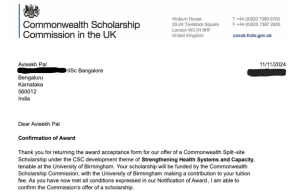 |
Avisekh Pal secures the Commonwealth split site PhD scholarshipCheck out the research activities of Prof. Manoj Varma’s group at: https://www.cense.iisc.ac.in/manoj-varma/ |
CeNSE community congratulates Avisekh Pal from the Nanopore Research group (PI: Prof. Manoj Varma) on securing the Commonwealth split site PhD scholarship for research exchange at the University of Birmingham for one year.
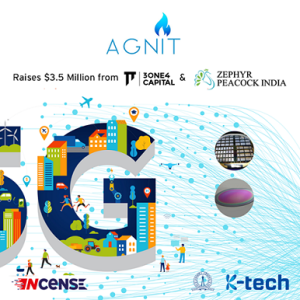 |
Congratulations to AGNIT Semiconductors Pvt Ltd on raising $3.5M from 3one4 Capital and Zephyr Peacock India.Know more about AgNIT: https://www.agnitsemi.com/ |
AGNIT is India’s first startup dedicated to Gallium Nitride semiconductor technology. Founded by faculty and alumni from CeNSE, DESE at IISc it is currently incubated at INCeNSE, a deep tech technology business incubator housed at CeNSE, IISc.
AGNIT is leading the charge in GaN technology to bridge critical gaps in India’s energy and telecom infrastructure, positioning itself at the forefront of global trends in AI, 5G, and power electronics.
With 15 years of R&D at IISc, AGNIT is set to scale production and expand into consumer electronics and EV markets, aiming for 100,000 chip sales this year!
 |
Thrilled to welcome Yield Engineering Systems (YES) as our newest member of the Industry Affiliate ProgramCheck out https://www.cense.iisc.ac.in/industry-relations/ to see what the IAP program offers |
YES is a leading provider of differentiated technologies for materials and interface engineering needed for a wide range of applications and markets. YES is a leading manufacturer of state-of-the-art cost-effective high volume production equipment for semiconductor Advanced Packaging solutions for wafers and glass panels. For more information, please visit https://www.yes.tech/
IAP is a flagship program engineered to bring industry on board at CeNSE and work with them as extended teams.
 |
Congratulating Theranautilus on being selected as one of the awardees of the nasscomm Emerge 50 2024!Check out their cool research here: https://theranautilus.com/ |
Theranautilus is a pioneering Deep-tech and hardware company incubated at our Technology Business Incubator – INCeNSE, housed at CeNSE, IISc. They focus on fabricating nanorobots, ensuring their safe deployment in living systems, and developing innovative mechanisms to remotely guide them to their target within the body.
The nasscom Emerge 50 award goes beyond economic impact—it celebrates startups that are shaping India’s Deep Tech revolution. This recognition highlights India’s transformation from a technology consumer to a creator, driving breakthrough research and redefining its global leadership in cutting-edge technology.
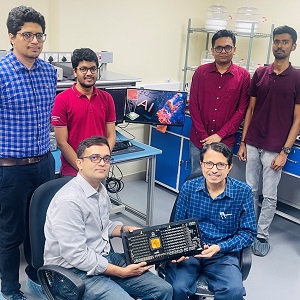 |
Brain on a Chip – a bunch of tiny molecules tour the future landscape of AICheck out more details of this publication at: https://www.nature.com/articles/s41586-024-07902-2 |
Researchers from Dr. Sreetosh Goswami’s group at CeNSE have made a breakthrough with a neuromorphic computing technology capable of storing and processing data across 16,500 states within a molecular film, as detailed in today’s Nature. This accelerator promises to overcome the limitations of traditional binary systems and could transform AI hardware by enabling complex computing tasks on personal devices with a fraction of the time and energy that traditional computers would need.
 |
Akansha – Empowering the girl child to explore nanotechnology |
19th to 30th August 2024
We thank Infineon Technologies for sponsoring yet another amazing series of Akansha where 30 class XI girl students from the Ekalavya Model Residential Schools at Chikkamaggaluru, Belagavi and Ballari participated this season in two batches from 19th August to 30th August 2024. During their 5-day stay on the Indian Institute of Science (IISc) campus, they engaged with researchers, scientific staff, and faculty. They performed hands-on nanotechnology experiments at NNFC, MNCF and also visited biology labs and undergrad labs. Additionally, they interacted with women students/ staff and faculty at CeNSE and got an unique opportunity of career counselling by the IISc placement officer, Dr. Jayanti Belur.
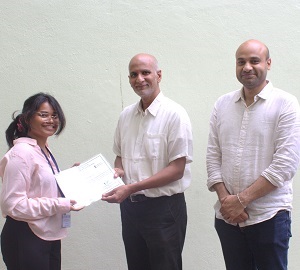 |
MoTA Advanced Training Program |
19th to 28th August 2024
The Ministry of Tribal Affairs, in association with the Centre for Nano Science and Engineering at the Indian Institute of Science, has launched a unique program to upskill students from the
tribal community in semiconductor technology. This program will train 450 students and faculty from the tribal community in semiconductor manufacturing technology.
The program is generously funded by the Ministry for Tribal Affairs (MoTA), Government of India, for the benefit of the tribal community.
The training was conducted in 2 stages – foundation course and Advanced course. The 1st Foundational course was a 60 hours program held from 16-20 June 2024 with online lectures and assignments.
The advanced program was a 90 hours course held from 19th to 28th August 2024 included offline lectures, assignments and hands-on training in Bengaluru. These courses are NSQF certified and was aimed at tribal students (pursuing 4th year of UG or 1st year of PG) and tribal faculty employed in a PG institute of higher learning for science and engineering.
 |
11th CeNSE Student Research Symposium |
The 11th CeNSE Student Research Symposium was held on September 21st and 22nd, 2023, at Centre for Nano Science and Engineering (CeNSE), Indian Institute of Science (IISc), this event was an absolute triumph.
For two action-packed days, our department’s talented students showcased their cutting-edge research through captivating oral and poster presentations. It was an excellent opportunity for them to gain insights into their peers’ work and foster potential collaborations that could spark ground-breaking innovations in the future. Moreover, the symposium had the privilege of hosting distinguished speakers from various sectors, including industry, start-ups, and strategic fields. Kusuma N CMTI – Central Manufacturing Technology Institute Applied Materials Applied Materials India Ravikumar Patil Lam Research Mahesh Lunavath Bharat Electronics Limited Sudhanshu Shekhar INFAB Semiconductor Pvt Ltd Ashutosh Bhabhe Paired with the networking luncheon, this event served as an invaluable platform for our students to immerse themselves in the latest industry developments, gain a deeper understanding of the current market landscape, and explore promising career prospects.
Hats off to the Remarkable Winners! Your dedication and hard work have truly shone through. And let’s not forget, each and every participant played an essential role in making this event a grand success. Congratulations to all!
A shoutout and thanks to all the members of the CeNSE community for making this event a great success.
 |
Tata – CeNSE, IISc Training Program on Semiconductor Fabrication |
1st to 31st July 2024
We were thrilled to host over 100 engineers from Tata Electronics Pvt. Ltd. at Centre for Nano Science and Engineering (CeNSE), Indian Institute of Science (IISc) for a comprehensive training program from 1st July to 31st July 2024.
During this month-long program, these talented engineers engaged in a series of training sessions, including classroom lectures and hands-on experience in semiconductor fabrication and characterization.
This initiative was a significant step in aligning with the India Semiconductor Mission, preparing our workforce for the promising ventures ahead.
We were honored to host Dr. Randhir Thakur, CEO and MD of Tata Electronics Pvt. Ltd., at the Valedictory Session on 30th July, 2024 of the Tata Electronics Pvt. Ltd.- Centre for Nano Science and Engineering (CeNSE), Indian Institute of Science (IISc) Semiconductor Fabrication Training.
The young, energetic participants also had the invaluable chance to engage directly with Dr Thakur, posing insightful questions about the future of Tata Electronics in India’s burgeoning semiconductor industry. Dr Thakur, alongside Phi Nguyen, offered promising insights and timelines, fueling our excitement for what’s to come.
 |
Meet the Centre of Excellence for Piezo-microelectromechanical system transducers |
Funded by Department of Science and Technology, this CoE aims to establish a vibrant scientific-industrial ecosystem focusing on the development of piezoelectric thin-film material synthesis/characterization and #MEMS design/fabrication technologies on a 4-inch Silicon-on-Insulator wafer.
This CoE (i) will cater to the exploratory study (materials and devices) demands of academia (ii) enable device and technology development for the strategic sector and (iii) build a roadmap for large-scale piezoelectric MEMS device fabrication in India. The thin-film deposition and transducer fabrication technologies developed by the researchers at Centre for Nano Science and Engineering (CeNSE), Indian Institute of Science (IISc) and CSIR – National Aerospace Laboratories (NAL) for 4-inch wafers under Phase-1 of the CoE will serve as a guideline for industries to set up and up-scale MEMS design and fabrication houses in India.
The team is led by Dr. Gayathri Pillai, and its members include, Dr. Pavan Nukala (CeNSE, IISc), Dr. Saurabh Chandorkar (CeNSE, IISc), Prof. Srinivasan Raghavan (CeNSE, IISc), Dr. Soma Dutta (Material Science, CSIR-NAL), Dr. Milind Acharya (Milman Thin Film Systems Pvt Ltd)
The kickoff meeting of the Center of Excellence (#CoE) for #Piezo-MEMS Transducers held at Centre for Nano Science and Engineering (CeNSE), Indian Institute of Science (IISc) on September 4th, 2023, marked a significant milestone in commencing the CoE’s activities. This event provided an ideal platform for CoE members and their associates to convene and set the groundwork for the initial phase of the CoE. The meeting was followed by an amiable dinner with the team and friends of the CoE community.
 |
Developing the semiconductor workforce in India using SemiverseTM solutions: LamResearch – CeNSE, IISc MoU Signing |
A Memorandum of Understanding (MoU) was signed between Lam Research and the Centre for Nano Science and Engineering (CeNSE), Indian Institute of Science (IISc), Bengaluru. This MoU is aimed at jointly developing a customized pilot course offering for Indian universities to teach semiconductor fabrication technology utilizing Lam Research’s Semiverse (TM) Solutions virtual fabrication software, SEMulator3D®.
“India’s commitment to delivering 85,000 engineers by 2030 requires a transformative approach towards how we educate and train semiconductor engineers. Training engineers in nanofabrication technologies in a virtual environment using industry-leading tools is a welcome step that will help address India’s semiconductor talent requirements in future. We are happy to partner with Lam Research in this regard. Lam Research has been our Industry Affiliate for many years, and this collaboration is an extension of our commitment to solving industry challenges through academic research and technological innovations,” said Prof. Srinivasan Raghavan, Chair, CeNSE, IISc.
 |
Celebrating Innovation and Impact: Shubhangi Bhardwaj and Team Secure 3rd Prize in Siemens Healthineers’ 2023 Innovation Think Tank Challenge |
Congratulations to Shubhangi Bhardwaj and team on winning the 3rd prize in the “Innovation Think Tank Challenge Program 2023” conducted by Siemens Healthineers. They proposed three probable solution ideas to increase access to healthcare and enable health equity. Amongst them, the most liked solution idea was “Trailblazing Health Equity: Sustainable Diagnosis and Medicine Provision in Underserved Areas” which was ideated and pitched via her and further supported by the team.
